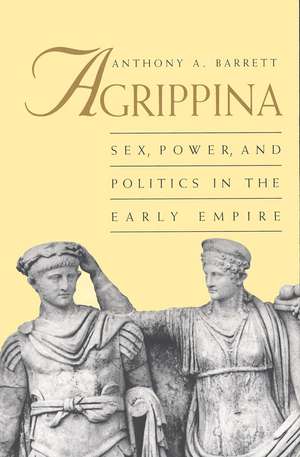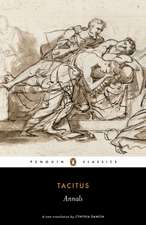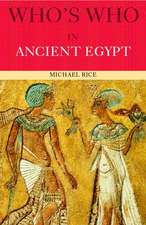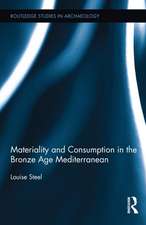Agrippina: Sex, Power, and Politics in the Early Empire
Autor Anthony A. Barretten Limba Engleză Paperback – 11 iul 1999
Agrippina the Younger attained a level of power in first-century Rome unprecedented for a woman. According to ancient sources, she achieved her success by plotting against her brother, the emperor Caligula, murdering her husband, the emperor Claudius, and controlling her son, the emperor Nero, by sleeping with him. Modern scholars tend to accept this verdict. But in his dynamic biography—the first on Agrippina in English—Anthony Barrett paints a startling new picture of this influential woman.
Drawing on the latest archaeological, numismatic, and historical evidence, Barrett argues that Agrippina has been misjudged. Although she was ambitious, says Barrett, she made her way through ability and determination rather than by sexual allure, and her political contributions to her time seem to have been positive. After Agrippina's marriage to Claudius there was a marked decline in the number of judicial executions and there was close cooperation between the Senate and the emperor; the settlement of Cologne, founded under her aegis, was a model of social harmony; and the first five years of Nero's reign, while she was still alive, were the most enlightened of his rule. According to Barrett, Agrippina's one real failing was her relationship with her son, the monster of her own making who had her murdered in horrific and violent circumstances. Agrippina's impact was so lasting, however, that for some 150 years after her death no woman in the imperial family dared assume an assertive political role.
Drawing on the latest archaeological, numismatic, and historical evidence, Barrett argues that Agrippina has been misjudged. Although she was ambitious, says Barrett, she made her way through ability and determination rather than by sexual allure, and her political contributions to her time seem to have been positive. After Agrippina's marriage to Claudius there was a marked decline in the number of judicial executions and there was close cooperation between the Senate and the emperor; the settlement of Cologne, founded under her aegis, was a model of social harmony; and the first five years of Nero's reign, while she was still alive, were the most enlightened of his rule. According to Barrett, Agrippina's one real failing was her relationship with her son, the monster of her own making who had her murdered in horrific and violent circumstances. Agrippina's impact was so lasting, however, that for some 150 years after her death no woman in the imperial family dared assume an assertive political role.
| Toate formatele și edițiile | Preț | Express |
|---|---|---|
| Paperback (2) | 367.21 lei 6-8 săpt. | |
| Yale University Press – 11 iul 1999 | 367.21 lei 6-8 săpt. | |
| Taylor & Francis – 26 aug 1999 | 372.07 lei 6-8 săpt. | |
| Hardback (1) | 1008.35 lei 6-8 săpt. | |
| Taylor & Francis – 5 iun 1996 | 1008.35 lei 6-8 săpt. |
Preț: 367.21 lei
Nou
Puncte Express: 551
Preț estimativ în valută:
70.27€ • 76.56$ • 59.21£
70.27€ • 76.56$ • 59.21£
Carte tipărită la comandă
Livrare economică 23 aprilie-07 mai
Preluare comenzi: 021 569.72.76
Specificații
ISBN-13: 9780300078565
ISBN-10: 0300078560
Pagini: 352
Ilustrații: 20 b-w illus.
Dimensiuni: 156 x 235 x 21 mm
Greutate: 0.53 kg
Editura: Yale University Press
Colecția Yale University Press
ISBN-10: 0300078560
Pagini: 352
Ilustrații: 20 b-w illus.
Dimensiuni: 156 x 235 x 21 mm
Greutate: 0.53 kg
Editura: Yale University Press
Colecția Yale University Press
Cuprins
Significant events and figures; background; family; daughter; sister; niece; wife; mother; the end; sources appendices: the year of Agrippina the younger's birth; the husbands of Domitia and Lepida III; the date of Nero's birth; the family of Marcus Aemilius Lepidus; Agrippina's movements in late 39; the date of Seneca's tutorship; the decline in Agrippina's power; the patronage of Seneca and Burrus in 54-9; SC on gold and silver coins of Nero; the final days of Agrippina.
Notă biografică
Anthony Barrett is Professor of Classics at the University of British Columbia in Vancouver. He studied at the Universities of Oxford, Durham and Toronto and has written extensively in the field of classical antiquity.
Recenzii
'The most valuable part of the book is the inventory of source material at the end where not only the more familiar literary evidence is catalogued but the coins, statues and inscriptions featuring Agrippina.' - Miriam Griffin, History Today
Descriere
Descriere de la o altă ediție sau format:
Barrett argues that Agrippina - mother of Nero, wife of Claudius and brother to Caligula - has been misunderstood and had much influence and power in her own right.
Barrett argues that Agrippina - mother of Nero, wife of Claudius and brother to Caligula - has been misunderstood and had much influence and power in her own right.






















